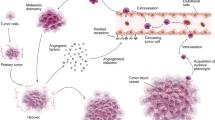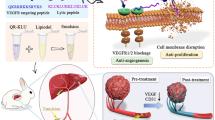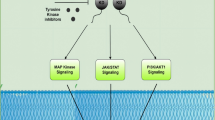Abstract
Angiogenesis is a critical step for the tumor therapy. Many angiogenic factors are involved in the tumor angiogenesis. In the course of our screening for inhibitors of angiogenin secretion, one of angiogenic factors, we have isolated a new terrein glucoside (1) and terrein (2) from the fermentation broth of fungal strain Aspergillus sp. PF1381. The structure and absolute stereochemistry of 1 was determined to be (4S,5R)-5-[(α-D-glucopyranosyl)oxy]-4-hydroxy-3-(E-1-propenyl)-2-cyclopenten-1-one on the basis of spectral and enzymatic analyses. Compounds 1 and 2 equally inhibited angiogenin secretion from androgen-dependent prostate cancer cells, LNCaP-CR, with IC50 values of 13 μM. However, both compounds did not affect VEGF secretion, another angiogenic factor. Furthermore, both compounds inhibited tube formation of human umbilical vein endothelial cells (HUVEC). These results suggested that 1 and 2 act as angiogenesis inhibitors through the inhibition of angiogenin secretion.
Similar content being viewed by others
Article PDF
References
Berger G, Benjamin LE . Tumorigenesis and the angiogenic switch. Nature Reviews Cancer 3: 401–410 ( 2003)
Folkman J . Role of angiogenesis in tumor growth and metastasis. Semin Oncol 29: 15–18 ( 2002)
Folkman J . Angiogenesis and angiogenesis inhibition: an overview. EXS 79: 1–8 ( 1997)
Ferrara N . VEGF and the quest for tumour angiogenesis factors. Nature Reviews Cancer 2: 795–803 ( 2002)
Chiarugi V, Magnelli L, Gallo O . Cox-2, iNOS and p53 as play-markers of tumor angiogenesis. Int J Mol Med 2: 715–719 ( 1998)
Singh RP, Agarwal R . Prostate cancer prevention by silibinin. Current Cancer Drug Targets 4: 1–11 ( 2005)
Rodriguez SK, Guo W, Liu L, Band MA, Paulson EK, Meydani M . Green tea catechin, epigallocatechin-3-gallate, inhibits vascular endothelial growth factor angiogenic signaling by disrupting the formation of a receptor complex. Int J Cancer 118: 1635–1644 ( 2006)
Fett JW, Strydom DJ, Lobb RR, Alderman EM, Bethune JL, Riordan JF, Vallee BL . Isolation and characterization of angiogenin, an angiogenic protein from human carcinoma cells. Biochem 24: 5480–5486 ( 1985)
Shapiro R, Riordan JF, Vallee BL . Characteristic ribonucleolytic activity of human angiogenin. Biochem 25: 3527–3532 ( 1986)
Yoshioka N, Wang Li, Kishimoto K, Tsuji T, Hu G . A therapeutic target for prostate cancer based on angiogenin-stimulated angiogenesis and cancer cell proliferation. Proc Natl Acad Sci USA 103: 14519–14524 ( 2006)
Horner JJ, Greenman J, Stafford ND . Angiogenic cytokines in serum and plasma of patients with head and neck squamous cell carcinoma. Clin Otolaryngol Allied Sci 25: 570–576 ( 2000)
Verstovsek S, Kantarjian H, Aguayo A, Manshouri T, Freireich E, Keating M, Estey E, Albitar M . Significance of angiogenin plasma concentrations in patients with acute myeloid leukaemia and advanced myelodysplastic syndrome. Br J Haematol 114: 290–295 ( 2001)
Zhao H, Grossman HB, Delclos GL, Hwang LY, Troisi CL, Chamberlain RM, Chenoweth MA, Zhang H, Spitz MR, Wu X . Increased plasma levels of angiogenin and the risk of bladder carcinoma: from initiation to recurrence. Cancer 104: 30–35 ( 2005)
Kawada M, Inoue H, Usami I, Takamoto K, Masuda T, Yamazaki Y, Ikeda D . Establishment of a highly tumorigenic LNCaP cell line having inflammatory cytokine resistance. Cancer Lett 242: 46–52 ( 2006)
Kawada M, Inoue H, Arakawa M, Takamoto K, Masuda T, Ikeda D . Highly tumorigenic human androgen receptor-positive prostate cancer cells overexpress angiogenin. Cancer Sci 98: 350–356 ( 2007)
Miwa I, Okuda J, Maeda K, Okuda G . Mutarotase effect on colorimetric determination of blood glucose with -D-glucose oxidase. Clin Chim Acta 37: 538–540 ( 1972)
Kolb HC, Hoffman MR . A total synthesis of racemic and optically active terrein (trans-4,5-dihydroxy-3-[(E)-1- propenyl]-2-cyclopenten-1-one). Tetrahedron: Symmetry 1: 237–250 ( 1990)
Raistrick H, Smith G . Biochemistry of microorganisms. XLII. The metabolic products of Aspergillus terreus Thom: a new mold metabolic product-terrein. Biochem J 29: 606–611 ( 1935)
Kawakubo J, Nishira H, Aoki K, Shinke R . Production of phenolic compounds by Aspergillus S-4 in sake-cake medium and identification of terrein. Biosci Biotec Biochem 57: 1208–1209 ( 1993)
Park SH, Kim DS, Kim WG, Ryoo IJ, Lee DH, Huh CH, Youn SW, Yoo ID, Park KC . Terrein: a new melanogenesis inhibitor and its mechanism. Cell Mol Life Sci 61: 2878–2885 ( 2004)
Kim DS, Cho HJ, Lee HK, Lee WH, Park ES, Youn SW, Park KC . Terrein, a fungal metabolite, inhibits the epidermal proliferation of skin equivalents. J Dermatol Sci 46: 65–68 ( 2007)
Kishimoto K, Liu S, Tsuji T, Olson KA, Hu GF . Endogenous angiogenin in endothelial cells is a general requirement for cell proliferation and angiogenesis. Oncogene 24: 445–456 ( 2005)
Author information
Authors and Affiliations
Corresponding author
Rights and permissions
About this article
Cite this article
Arakawa, M., Someno, T., Kawada, M. et al. A New Terrein Glucoside, a Novel Inhibitor of Angiogenin Secretion in Tumor Angiogenesis. J Antibiot 61, 442–448 (2008). https://doi.org/10.1038/ja.2008.60
Received:
Accepted:
Issue date:
DOI: https://doi.org/10.1038/ja.2008.60
Keywords
This article is cited by
-
Unearthing the fungal endophyte Aspergillus terreus for chemodiversity and medicinal prospects: a comprehensive review
Fungal Biology and Biotechnology (2023)
-
Genetic and Histopathological Alterations in Caco-2 and HuH-7 Cells Treated with Secondary Metabolites of Marine fungi
Journal of Gastrointestinal Cancer (2022)
-
Induced terreins production from marine red algal-derived endophytic fungus Aspergillus terreus EN-539 co-cultured with symbiotic fungus Paecilomyces lilacinus EN-531
The Journal of Antibiotics (2020)
-
The catalytic activity and secretion of zebrafish RNases are essential for their in vivo function in motor neurons and vasculature
Scientific Reports (2019)
-
Improving the yield of (+)-terrein from the salt-tolerant Aspergillus terreus PT06-2
World Journal of Microbiology and Biotechnology (2016)



